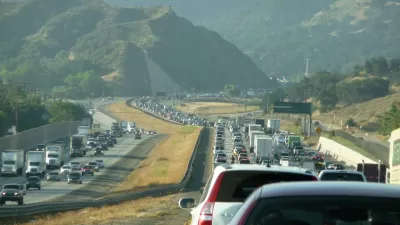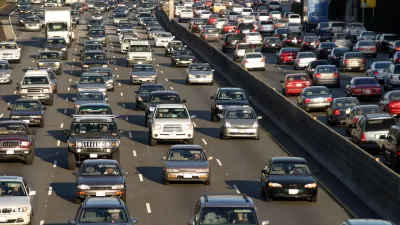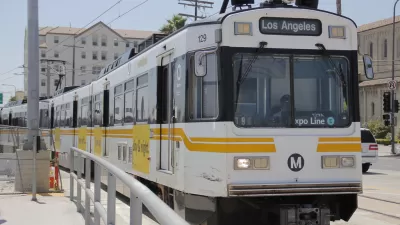Architect and planner Gerhard W. Mayer asserts that a city developed to accommodate cars is no place for paltry public transit offerings; Los Angeles needs major changes to its DNA if it wants to remain viable.

"Decades of development and sprawl are rightfully blamed for the degradation of our quality of life, and for our near unbearable congestion. This has turned many Angelenos against development and into NIMBY activists ready to object anytime to anything. But contrary to NIMBY creed, we cannot do nothing. The path we are on is really an economic fiasco in waiting," writes Mayer.
"In greater Los Angeles, we are using more than 60 percent of our land for our automobiles (roads, parking lots, landscaped buffers, traffic islands, etc.)." This, he says, is a recipe for economic disaster because a smaller proportion of the city creates value. He offers a vision of a new Los Angeles where the millions of dollars currently wasted in traffic can be diverted to a vibrant local economy and where quality of life is excellent.
"Imagine our city with bustling pedestrian zones, coffee shops, and corner stores, markets, plazas, and lots of housing options surrounding our public transit hubs. Then imagine those hubs separated by low-density areas filled with picturesque narrow residential streets, bicycle networks, community gardens, and parks. All could be connected with public transit, and all of this in our near-perfect climate, and you could still drive, if you chose to."
"But we cannot achieve this by only making minor adjustments to our land-use laws based on the popular consensus of people who want to continue to drive yet want all the other people to get off the road. We need to change much more rapidly and radically and we must get people mobilized toward change. We must create grass roots “YIMBY” (Yes, in my yard!) movements that demand different solutions; that is really the challenge of our time."
FULL STORY: Driving Toward Bankruptcy

Alabama: Trump Terminates Settlements for Black Communities Harmed By Raw Sewage
Trump deemed the landmark civil rights agreement “illegal DEI and environmental justice policy.”

Planetizen Federal Action Tracker
A weekly monitor of how Trump’s orders and actions are impacting planners and planning in America.

The 120 Year Old Tiny Home Villages That Sheltered San Francisco’s Earthquake Refugees
More than a century ago, San Francisco mobilized to house thousands of residents displaced by the 1906 earthquake. Could their strategy offer a model for the present?

USDOT Repeals Emissions Monitoring Rule
A Biden-era regulation required states to report and plan to reduce transportation-related emissions.

CaBi Breaks Ridership Record — Again
Washington D.C.’s bike share system is extremely popular with both residents and visitors.

San Francisco Opens Park on Former Great Highway
The Sunset Dunes park’s grand opening attracted both fans and detractors.
Urban Design for Planners 1: Software Tools
This six-course series explores essential urban design concepts using open source software and equips planners with the tools they need to participate fully in the urban design process.
Planning for Universal Design
Learn the tools for implementing Universal Design in planning regulations.
Clanton & Associates, Inc.
Jessamine County Fiscal Court
Institute for Housing and Urban Development Studies (IHS)
City of Grandview
Harvard GSD Executive Education
Toledo-Lucas County Plan Commissions
Salt Lake City
NYU Wagner Graduate School of Public Service





























